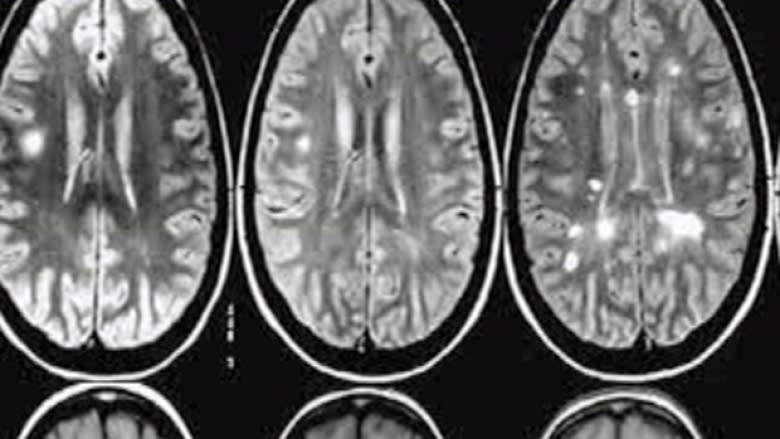Toronto hospital to build $30M treatment and research centre for MS patients
Erin Truax remembers clearly the day she was diagnosed with multiple sclerosis.
"It was really, really tough," Truax told CBC's Metro Morning on Wednesday.
Truax immediately thought about Annette Funicello, a late American actress who found fame as a Mouseketeer with Disney's The Mickey Mouse Club, who developed MS later in life.
MS is an autoimmune disease of the central nervous system. Its symptoms include extreme fatigue, lack of co-ordination, weakness, tingling, impaired sensation, vision problems, bladder problems, cognitive impairment and mood changes.
"Next I thought: 'Would I be able to have kids? Will I be able to be an active person?' I was scared and I cried a lot."
Truax, now a patient with MS, said it was a lazy Sunday afternoon in April when the first symptoms appeared. Her right hand went numb for 15 minutes. The next day, she could not type properly because of numbness in three right fingers. She had two CT scans followed by a MRI, and two weeks later, she was diagnosed.
Now, months later, Truax says she thinks that a new $30 million treatment and research centre, announced on Wednesday by St. Michael's Hospital in Toronto, will provide patients with hope.
St. Michael's Hospital said the centre, slated to open in 2020, will be called the Barlo MS Centre. It will be named after John and Jocelyn Barford and Jon and Nancy Love, two families who donated $10 million each to the cause.
The centre will occupy the top two floors of the hospital's new 17 storey Peter Gilgan Patient Care Tower currently under construction in downtown Toronto. The hospital has the largest MS clinic in Canada, with about 7,000 patients.
Dr. Xavier Montalban, a neurologist at St. Michael's Hospital, said Canada has the highest prevalence of MS in the world. One out of every 340 Canadians has the disease and MS is known as "Canada's disease," according to St. Michael's Hospital.
The disease affects three times as many women as men and affects people in the prime of life, with the average age of onset being 31.
Montalban, who was recruited from the MS Centre of Catalonia in Barcelona, Spain this summer to lead the centre, told CBC's Metro Morning on Wednesday that Toronto is the right place for such a facility.
"We had the opportunity, donors, very important, also the space, and the outstanding professionals. I thought it was the right time for this project," he said.
The centre will offer one-stop care, which means patients will be able to be diagnosed, treated and given the chance to take part in research, all at the same location. It will have neurologists, nurses, social workers, physiotherapists, occupational therapists, speech therapists and other professionals.
The centre will have an independent living laboratory, a living space where people with mobility or cognitive difficulties can learn how to adapt their movements to their surroundings. And it will have its own infusion clinic where patients will be able to receive treatments intravenously.
As part of the announcement, the St. Michael's Hospital Foundation said it is launching a campaign to raise $10 million to build the centre.
Montalban said the hospital is already recruiting a neuropsychologist who specializes in how the brain and the rest of the nervous system influences cognition and behaviour.
People need to talk about MS, patient says
As for Truax, she said she has decided to speak out about the disease now. When first diagnosed, she was embarrassed and said the hardest part was telling her parents.
"It's not easy when you find out your child is sick. They're my Mom and Dad," she said.
"If I don't talk about it and other people don't talk about it that have MS, people aren't going to know anything about it."



